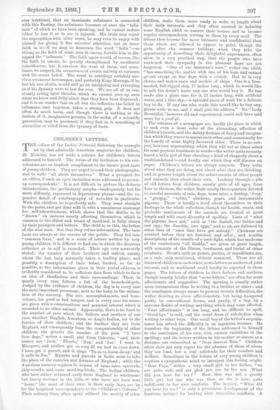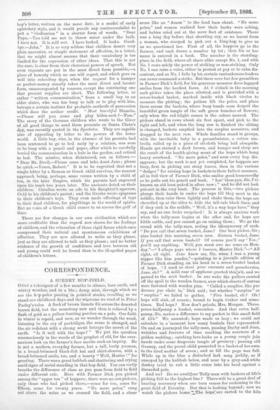CHILDREN'S LETTERS. T HE editor of the Ladies' Pictorial, following the
example set by that admirable American magazine for children, St. Nicholas, has set aside a column for children's letters addressed to himself. The terms of the invitation to his con- tributors are an implicit compliment to the innate good taste of young children. They are urged to send their photographs, and to write "all about themselves." What a prospect for an editor, if such an open invitation were addressed to grown- up correspondents ! It is not difficult to picture the delicate introductions, the preliminary coughs—inadequately, but far more diffusely, expressed in deprecatory phrase—and the ex- pansive detail of autobiography of nobodies in particular. With the children he is perfectly safe. They come straight to the point, and get done with it, with a unanimous contempt for self-advertisement, which shows that the dislike to be " drawn " on matters nearly affecting themselves, which is eommon to the oldest and wisest of mankind, is fully shown by their youngers and betters. The child is, in this, the father of the wise man. Not that they refuse information. The bare facts are always at the service of the public. They fall into "common form," and in a score of letters written by very young children, it is difficult to find one in which the decorous reticence as to self is exceeded. Their age, very accurately stated; the number of their brothers and sisters, among whom the last baby naturally takes a leading place; and possibly a. description of their hOme, limited, as far as possible, to the information given in their postal address, is evidently considered to be sufficient data from which to form an idea of theniselves and their surroundings. Then, in nearly every case, follows a list of the household-pets. Judged by the evidence of children, the dog is in every ease the most important personage, next to the baby, in the estima- tion of the nursery. His size, accomplishments, and bene- volence, his good or bad temper, and in every case his name, are given with a conscientious and personal interest which is accorded to no other animal. Apparently, there is no limit to the number of pets which the fathers and mothers of our race, whether English, American, or Anglo-Indian, set to the fancies of their children ; and the further they are from England, and consequently from the companionship of other children, the greater the number of the pets. "I have four dogs," writes a small girl from Calcutta, "and their names are Jack," Florrie," Ray,' and Joe.' I went to Mizapore, and mother got so very ill we had to come down. I have got a parrot, and it sings Ta-ra-ra-boom-de-ay,' and it calls to Joe." Mynahs and parrots in India seem to take the place of the canaries and dormice of England ; while the American nursery rejoices in armies of tame mice, squirrels, chip-munks, and tame mocking-birds. The Indian children, who have either returned early from England to wholesome but lonely stations in the hills, or who have not been sent "home," like most of their race, in their early days, are by far the brightest correspondents to the "Children's Column." Their solitary lives, often spent without the society of other children,. make them more ready to write at length about their daily interests, and they often succeed in inducing some English child to answer their letters and to become regular correspondents, writing to them by every mail. The letters then become far more intimate and confidential than those which are allowed to appear in print, though the girls, after the summer holidays, when they take the opportunity of describing their delightful experiences, often show, in a very practical way, that the people who have awakened their sympathy in the pleasant days are not forgotten. "One of our boatman's sons," writes one child, "has something the matter with one of his legs, and cannot go out except on fine days with a crutch. But he is very clever, and makes mats and models of ships. One is a four.
masted, full-rigged ship, 17 inches long; which he would like to sell, but doesn't know any one who would buy it. He has made also a glass case for it, 23 inches long, with artificial water, and a blue sky,—a splendid piece of work for a delicate boy to do. If any one who reads this would like to buy any, please write to me, and I shall give his address." No "Lady Bountiful," however old and experienced, could well have said more for a protege.
The columns of a newspaper are hardly the place in which to seek even a faint echo of the abounding affection of children's hearts, and the dainty fictions of fancy and imagina- tion which they weave to amuse each other, and occasionally for the benefit of some highly favoured elder. There is no sub- ject, however unpromising, which they will not at times select for semi-poetical treatment in words—the writer quite recently heard a little girl of four chanting a kind of rhapsody about a washhandstand I—and hardly one which they will discuss on paper. Children's letters are always concrete. They write about what they are doing, not about what they are thinking, and at greater length about the achievements of other people and animals than about their own. Looking through a pile of old letters from children, mostly girls of all ages, from four to thirteen, the writer finds nearly three-quarters devoted to careful accounts of cats, dogs, tame mice, a donkey, 'Joey,' a " ginipig," " rabits," chickens, goats, and innumerable pigeons. There is hardly a word about themselves or their feelings in the whole collection, though the health, wants, and probable sentiments of the animals are treated at great length and with every diversity of spelling. Lists of "what the pigeons have got," such as "the fantail, two babies and one egg; the Jacobin, two eggs," and so on, are followed by other lists of "ones that have got nobody." Chickens are counted before they are hatched, and after ; and terrible descriptions of the results of a cock-fight, which has made one of the combatants "all bloddy," are given at great length, with accounts of the illness, treatment, and burial of other creatures. Events, such as games, parties, or expeditions, are, as a rule, only mentioned, without comment. These are all letters of children to each other, news-letters on matters of joint interest, and so sentiment could hardly be expected in these pages. The letters of children to their fathers and mothers, though usually briefer than "news-letters," are often far more affectionate and suggestive. The opening is usually rather more ceremonious than in writing to a brother or sister; and the conclusion always seems to present certain difficulties, the writer desiring to close affectionately, but being hampered partly by conventional forms, and partly, if a boy, by a nervous dislike of writing anything which may seem affected. "Your affectionate" is too long, and too difficult to spell. " Good-bye " is cold, and the usual form of valediction when writing to other boys. One small boy of the writer's acquain- tance has solved the difficulty in an ingenious manner. He transfers the beginning of the letters addressed to himself to the conclusion of his own, with certain variations in the spelling ; and the letters written to his mother or sisters at a distance are subscribed as "from dearest Tom." Children often show not only regret for the absence of those of whom they are fond, but a real solicitude for their comfort and welfare. Sometimes in the letters of very young children it requires a sympathetic mind to interpret this feeling aright. "Dear Papa," writes a very small girl to her father, "we are quite well, and are glad you are by the sea. What did you have for tea P" Now, this was not a greedy little girl, but one who was then, as she is now, quite indifferent to her own comforts. The inquiry, "What did you have for tea P" is only a precocious development of the feminine instinct for looking after masculine comforts. A boy's letter, written on the same date, is a model of early epistolary style, and it would puzzle any controversialist to put a " vindication " in a shorter form of words. "Dear Papa,—You told me not to throw water under the bath. I have not. It is still wet. I have looked. It leaks. Good- bye.—John." It is so very seldom that children desert very plain narrative, or simple statement of affection, in a letter, that we might almost assume that their vocabulary is too limited for the expression of other ideas. That this is not the case, is clear from their rhetorical powers of speech. But even requests are put in the most direct form possible,—a piece of honesty which no one will regret, and which goes on well into schoolboy days, when the request for a hamper or pocket-money usually takes the most direct and laconic form, unaccompanied by reasons, except the convincing one that present supplies are short. The following letter, or rather "written communication," from a small boy to an elder sister, who was too busy to talk or to play with him, betrays a certain instinct for probable methods of persuasion which does the author credit. "Most beautiful Blanche, —Please will you come and play hiden-seek ?—Tom." The story of the German children who wrote to the Giver of all good things to send them presents on Santa Claile's day, was recently quoted in the Spectator. They are capable also of appealing by letter to the powers of the lower world. A little boy, who, in the absence of his parents, had been sentenced to go to bed early by a relation, was seen to be busy with a pencil and paper, after which be carefully buried the communication in a hole in the garden, and retired to bed. The missive, when disinterred, ran as follows :— "Dear Mr. Devil,—Please come and take Aunt Jane ; please be quick.—Yours, Robert." It is to be regretted that not a single letter by a Roman or Greek child survives, the nearest approach being, perhaps, some verses written by a child of ten, in the later Empire, which his parents had engraved upon his tomb two years later. The ancients doted on their children. Catullus wrote an ode to his daughter's sparrow, Ovid to his children's parrot; and the Greeks wrote epigrams to their children's toys. They even made offerings of toys to their dead children, for playthings in the world of spirits. But no voice of a Greek child comes to us across the gulf of time.
There are few changes in our own civilisation which are more creditable than the regard now shown for the feelings of children, and the relaxation of those rigid forms which once compressed their natural and spontaneous exhibitions of affection. They are now allowed to write as they please, just as they are allowed to talk as they please ; and no better evidence of the growth of confidence and love between old and young could well be found than in the ill-spelled pages of children's letters.



































 Previous page
Previous page